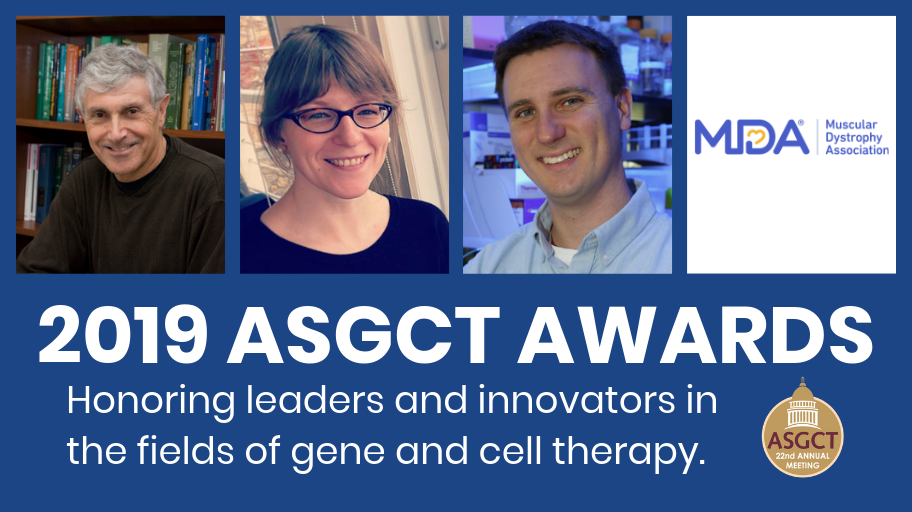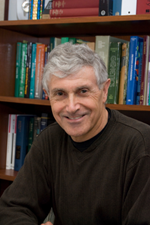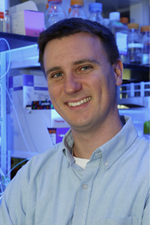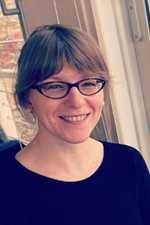ASGCT To Honor Four Ground-Breaking Researchers at 22nd Annual Meeting
ASGCT Staff - March 26, 2019
ASGCT is proud to introduce the four recipients of the Society's 2019 Outstanding Achievement Award, Outstanding New Investigator Awards, and the Sonia Skarlatos Public Service Award.

ASGCT is proud to introduce the four recipients of the Society's 2019 Outstanding Achievement Award, Outstanding New Investigator Awards, and the Sonia Skarlatos Public Service Award.
All four awards will be presented at the ASGCT 22nd Annual Meeting.
Outstanding Achievement Award
 Dr. John Rossi
Dr. John Rossi
Lidow Family Research Endowed Chair and Professor in the Dept. of Molecular and Cellular Biology, Beckman Research Institute of the City of Hope
Dr. John Rossi received a BA in biology from the University of New Hampshire and a Ph.D. in microbial genetics from the University of Connecticut. Following a post-doctoral fellowship in molecular genetics at Brown University Medical School, he has been on the faculty of City of Hope National Medical Center in Duarte, CA. Rossi is widely regarded as a World Leader in the development of RNA interference and in clinical research with nucleic acids for the treatment of various diseases. His present focus is on enhancing the intracellular efficacy of ribozymes, small RNAs and siRNAi and their application to gene therapy for HIV and cancer. He is the editor in chief of Molecular Therapy - Nucleic Acids and deputy editor of Molecular Therapy. He has authored more than 275 peer-reviewed papers and more than 70 book chapters.
Rossi co-founded Dicerna Pharmaceuticals and is its SAB Chairman. He also co-founded Calando Pharmaceuticals and is the founding president of the Oligonucleotide Therapeutics Society.
The ASGCT Outstanding Achievement Award recognizes an ASGCT Member who has achieved a pioneering research success, a specific high impact accomplishment, or a lifetime of significant contributions to the field of gene and cell therapy. It is the Society’s highest honor.
Outstanding New Investigator Awards
 Dr. Steven Gray
Dr. Steven Gray
Associate Professor, Dept. of Pediatrics, University of Texas Southwestern
Dr. Steven Gray earned his Ph.D. in molecular biology from Vanderbilt University in 2006, after earning a BS from Auburn University. He performed a postdoctoral fellowship focusing on gene therapy in the laboratory of Jude Samulski at UNC-Chapel Hill and is currently an Associate Professor in the Department of Pediatrics at the University of Texas Southwestern Medical Center. Gray is the director of the UTSW Viral Vector Facility and maintains affiliations with the Department of Molecular Biology, the Department of Neurology and Neurotherapeutics, the Eugene McDermott Center for Human Growth and Development, and the Hamon Center for Regenerative Science and Medicine at UT Southwestern.
Gray’s core expertise is in AAV gene therapy vector engineering, followed by optimizing approaches to deliver a gene to the nervous system. As AAV-based platform gene transfer technologies have been developed to achieve global, efficient, and in some cases cell-type specific CNS gene delivery, his research focus has also included preclinical studies to apply these reagents toward the development of treatments for neurological diseases. Currently these include preclinical studies for Rett Syndrome, Giant Axonal Neuropathy (GAN), Tay-Sachs, Sandhoff, Krabbe, AGU, Charcot-Marie-Tooth, Batten, and Austin diseases, and have expanded into human clinical studies to test a gene therapy approach for GAN.
 Dr. Anna Kajaste-Rudnitski
Dr. Anna Kajaste-Rudnitski
Group Leader, San Raffaele Telethon Institute for Gene Therapy
After studying innate immune responses and genetic susceptibility to flaviviral infections as part of her Ph.D. program at the Pasteur Institute in Paris, Dr. Anna Kajaste-Rudnitski continued her post-doctoral training in molecular virology at the San Raffaele Scientific Institute in Milan, Italy, working on influenza and HIV. She later joined the San Raffaele Telethon Institute for Gene Therapy (SR-Tiget) as Project Leader in 2012 and became Group Leader in July 2016.
Kajaste-Rudnitski's research focuses on identifying the antiviral factors and innate sensing pathways that prevent efficient modification of HSC with the aim of mitigating their effects using methods developed through a thorough understanding of their mechanisms of action by merging her background in innate immunity and virology with acquired competences in hematopoietic stem cell (HSC) gene therapy. Her studies have significantly contributed to the emerging field of innate immune hurdles to gene therapy and provide insight for the development of innovative cell and gene therapies and to fight infectious and autoimmune diseases in the future.
Several Outstanding New Investigators are recognized each year based on their contributions to the field of gene and cell therapy. Investigators from academia, research foundations, government, and industry are all eligible to be nominated for awards.
Sonia Skarlatos Public Service Award
Muscular Dystrophy Association
Accepted by Lynn O’Connor Vos, President and CEO
Muscular Dystrophy Association (MDA) has long appreciated that gene therapy, by targeting the very root cause of the disease, has tremendous therapeutic promise in a wide array of neuromuscular diseases. Thus, MDA has contributed greatly to the field of muscle disease and toward landmark research advances, including the identification of the first human disease-causing gene, as well as the first human trial of gene transfer for a muscle disease.
For several decades, MDA-supported researchers have discovered the gene-causing mutations for many other neuromuscular disorders, developed and refined gene delivery tools and methods, and established protocols for safe and effective gene therapy clinical trials. This was achieved by robust and rigorously-reviewed MDA grant programs aimed at driving the field of gene therapy forward, as well as MDA taking a leadership role in continually raising awareness and convening key experts to address challenges.
Indeed, that several experimental gene therapies are in advanced clinical trials in our diseases is the result of decades of effort from a large community partners --including families, donors, researchers, and clinicians. MDA will continue to work together with these partners, to keep the momentum going towards more treatments and cures.
Named for its inaugural co-recipient and tireless gene therapy advocate, the Society’s Sonia Skarlatos Public Service Award recognizes a person or group that has consistently fostered and enhanced the field of gene and cell therapy through governmental agencies, public policy groups, public education, or non-governmental charitable organizations.
Related Articles